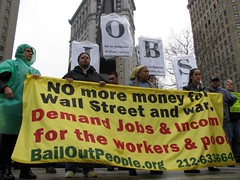
Berta Ceci-Joubert, Sandra Hines, Pam Africa on the lead banner during the Bail Out the People Movement demonstration on Wall Street, April 3, 2009. (Photo: Alan Pollock)
Originally uploaded by Pan-African News Wire File Photos
Published Nov 19, 2009 9:14 PM
Excerpts from a talk by Berta Joubert-Ceci of Philadelphia to the WWP National Conference, Nov. 14.
I want to ask you to please stand up. Let us give homage to the courageous people of Honduras. That resistance that today, for 140 days, has been in the streets, demanding the restitution of their president, José Manuel Zelaya Rosales, and the celebration of a Constitutional Assembly that will end injustice and inequality.
Let us applaud their courage and their fierce determination to end the criminal military coup perpetrated by the oligarchy and the U.S. This resistance that is armed only with their dignity face day by day military and police armed to the teeth by the U.S.
Let us not observe a moment of silence, comrades, but a moment of applause for the martyrs whose blood has instilled more strength into the people. For the resistance let us applaud.
This is a struggle between two classes—those who exploit: the oligarchy, the transnational corporations—and those who are exploited: the workers and peasants, the poor in Honduras. Two classes whose interests are totally contradictory. It might have not begun as such, but it has developed into it.
The constant demonstrations, the meetings to organize and to discuss the crisis, the interaction among unions, youth, peasants, Afro-Hondurans and women, have tremendously increased political consciousness. There has been a remarkable jump from quantity into quality. They see all the wealth that they have produced. First in the fields—remember Honduras was the “Banana Republic” of Chiquita—and now in the maquilas, the Adidas, the Nikes and so many others. They see all the wealth they make go into the hands of the rich families in Honduras and to the U.S. corporations.
Their struggle now is not only to reinstate Zelaya but for control of the resources, the economy and the country, to take it away from the hands of the oligarchy and the corporations. That is what the struggle for a Constitutional Assembly represents. That is why it is so important, because the current constitution paved the way to privatizations and the transfer of wealth from the working class to the rich and the corporations.
President Zelaya’s increasing the minimum wage was the lightning rod. The oligarchy and U.S. corporations initiated the road to the June 28 coup. They would not allow a wage raise or a change of their valuable constitution. But this was also a lesson for the masses: how not even a slight increase on their share of the profits would be tolerated by the rich! And the repression by the state has only pushed the struggle forward.
The struggle in Honduras is part of the tremendous popular developments in Latin America, where the people are trying to take control of their destiny away from U.S. imperialist domination. It is a struggle for the control of society between the workers and the peasants on one side, and the oligarchy and the U.S. corporations on the other. It is happening in Venezuela, Bolivia, Ecuador and Nicaragua. Progressive governments in those countries are allied with the masses and are trying to integrate their countries into a powerful bloc that stands up against imperialism. That is what ALBA represents.
But there are many other struggles in the region. For example, in Puerto Rico there is a workers’ movement against the layoffs by the pro-U.S. government of Luis Fortuño that has organized work stoppages and is planning a general strike. In Mexico, the movement is growing with militant actions after the layoffs of 46,000 workers from the electricity industry by President Felipe Calderón, a close U.S. ally. In Colombia, the criminal pro-U.S. Uribe paramilitary regime has continued to be fought by an armed insurgency and a popular movement, the former with weapons and the social movement with demonstrations.
Washington is preparing to mount a new military offensive in Latin America to break these progressive developments. The coup in Honduras has been a warning to these countries that imperialism will not stand quietly by and let the people choose their destiny.
That is why the U.S. will accept the result of the Honduran elections with or without President Zelaya restored to office. That is why the U.S. has just signed an agreement with Colombia for the use of seven military bases, which gives the U.S. military almost unlimited access to that country’s facilities and guarantees impunity for any criminal act by U.S. forces and that explicitly states the need to wage action against countries that the U.S. considers “enemies,” like Venezuela.
There is also the IV Fleet, which can even go into the rivers of the countries in Latin America, and the possibility of four new bases in Panama. And besides the direct military threats, there are the CIA operations to destabilize governments with the help of the opposition forces in those countries. The danger is real.
But the U.S. always discounts the peoples’ powerful will to struggle and international solidarity.
We, the working class of the world have a social connection. We have the same interests as the workers in Honduras, in Mexico and everywhere else. If their interests are threatened, so are ours. And so we must respond, with solidarity.
And for us, here in the U.S., it is crucial that we be the most internationalist, because this is the center of imperialism, we then MUST be internationalists to the core!
¡Viva la Resistencia hondureña!
Long live the workers’ struggle!
¡El pueblo unido, jamás será vencido!
-------------------------------------------------------------------------------------------
Articles copyright 1995-2009 Workers World. Verbatim copying and distribution of this entire article is permitted in any medium without royalty provided this notice is preserved.
Workers World, 55 W. 17 St., NY, NY 10011
Email: ww@workers.org
Page printed from:
http://www.workers.org/2009/world/honduras_1126/
No comments:
Post a Comment